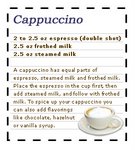Resveratrol has been shown to reduce cancer incidence in animals by affecting one or more stages in cancer development. Cellular and animal studies of red wine have been analyzed in several cancers including leukemia, skin, breast and prostate. The NCI notes that resveratrol can reduce inflammation, which may be an effective chemo-preventative agent in three various stages of the cancer process, including initiation, promotion and even progression. They further report that studies published in the International Journal of Cancer showed that drinking a glass of red wine a day may reduce risk of developing prostate cancer by 50%, and that men who consumed four or more four-ounce glasses of red wine per week had a 60% lower incidence of the more aggressive types of prostate cancer.
NCI also posted in their "Fact Sheet" section on December 6, 2002, benefits of tea and cancer prevention. They explain that laboratory studies show certain compounds from tea, known as catechins, act as powerful inhibitors of cancer growth in several different ways. They note some epidemiologic studies in humans, comparing tea drinkers to non-tea drinkers. They indicate that in one study out of China, over 18, 000 male tea drinkers were about half as likely to develop stomach or esophageal cancer compared to men who drank little tea1. There was another study in the Netherlands, however, that didn't support these findings.
Since the information was posted on the NCI site, there have been numerous studies regarding the benefits of green tea. A study on green tea was just published on Dec. 20, 2006 in the medical journal Carcinogensis. This study, involving over 1,000 women, indicated that those who consumed green tea at 500 to 749 grams per year reduced their risk of breast cancer by an amazing 41%2. This would be a level of at least 1,500 mg per day. Researchers concluded long-term and regular consumption of green tea can reduce risk of breast cancer.
Truly amazing information from a federal medical agency that tends to promote drugs, radiation and surgery. Of course, you know from reading For Your Health that the above-noted nutrients can be extremely powerful agents. Interestingly, there was just a study out of Germany indicating that polyphenols from tea can have benefits blunted by adding milk. The study, which was reported online in the European Heart Journal, studied 16 healthy women volunteers over age 503. When the women drank half liter of tea, their arteries relaxed to a significant degree, much more than when they drank hot water or tea with milk. Researchers felt that the casein proteins in the milk may have the neutralizing effect on the tea polyphenols.
Make sure to choose a high-quality multi-vitamin with optimal combinations and levels of antioxidants such as vitamin C, E, standardized green tea, grape seed, lutein and many other important nutrients.












1 comment:
Awesome post! Have you had a chance to watch 60 Minutes, Fox News, Oprah or Barbra Walters segments last weekend about it?
Basically, it shows promise in mice. For mice, has shown major health improvements including blood sugar control. Keep in mind that 6 out of 10 major drug successes in mice - fail in humans. But the limited human trials showed promise and there are some patients that claim it helps. However, this could be the 'placebo effect,' and only empirical data under controlled experiments can tell for sure. It will take a few years for these clinical trials to conclude.
You can get supplements of the extract right now. While it is safe, it is not guaranteed to work. Before making a decision, you should watch all the videos. Here's the a recap from all the trustworthy shows:
http://resveratrolcertifiedsupplements.com/?page_id=4
I did some research and learned the following: You can only get 1-2mgs of it in a single bottle of wine. So, white, it's a good excuse to drink wine, but you really won't get much benefit. There are resveratrol supplements on the market - but many do not have the required strength and they don't work for everyone. The only way to know for sure is to try the supplements. Hope you find this interesting... its a future hope for the fountain of youth and treatments (not cures) for countless diseases.
-Linda, the Good Nurse.
Post a Comment